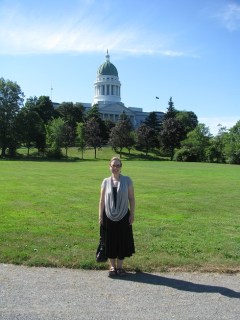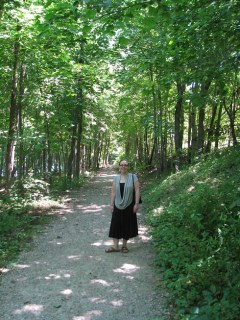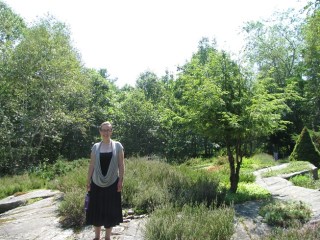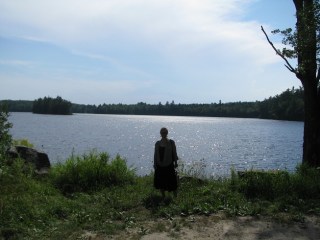 Sunday was Mer’s day again, and she had an interesting take. Since it was Sunday, she figured many things would be closed, and she also wanted to be mellow. So, she decided we should visit several towns and just wander in them.
Sunday was Mer’s day again, and she had an interesting take. Since it was Sunday, she figured many things would be closed, and she also wanted to be mellow. So, she decided we should visit several towns and just wander in them.
We started by heading back toward Augusta, and we stopped in the small town of Winthrop. We were both surprised to see a large building housing Tubby’s Ice Cream, which we thought was only a small ice cream stand in Wayne near my Dad’s place. We parked the car just past Tubby’s, and we wandered down main street and looked around the town. For the return trip, Mer wanted to walk back roads toward the large lake that is next to Winthrop, so we did that and found ourselves at a small beach. We sat on a bench and watched people swimming, and we watched the lake, too. After a time, we went back to the car via back roads, and continued to head toward Augusta.
But not for long. Mer had me swing onto a side road that I had never been down before. It was supposed to be a scenic route to Augusta, but we must have turned the wrong way because we ended up being near Monmouth. That suited Mer fine since she wanted to go there to tour the theater building which houses some offices and a library. Sadly, the building was closed for Sunday, so we wandered around in the cemetery next door. The cemetery held up our observations from Maine cemeteries, that you die before forty or after eighty – there do not seem to be many sixty-year-olds dying in Maine.
After Monmouth, we went to Gardiner, which is next to Augusta. The downtown is very pretty, with cute shops and eateries, but they were mostly closed. We still enjoyed wandering the town, and we found our way to the boardwalk that runs along the river (the Kennebec). We walked along the boardwalk, which is probably normally pleasant, but this was one of two hot days we had in Maine, and the boardwalk was radiating heat back up at us. It was a pretty view, though. At the end of the boardwalk was a trail through the woods. We walked along this in the shade, and the trail went about a mile into the woods before it looped around on itself in a pretty little garden area.
 After Gardiner, we went to another next-to-Augusta town, Hallowell. Hallowell is really small, but pretty. We found an open bakery and got whoopie pies. Sadly, they were just okay – they were very mild (not sweet), but we needed the rest and a little food, so it was not a wasted stop. We walked down by the river a little here as well, but the riverfront was small.
After Gardiner, we went to another next-to-Augusta town, Hallowell. Hallowell is really small, but pretty. We found an open bakery and got whoopie pies. Sadly, they were just okay – they were very mild (not sweet), but we needed the rest and a little food, so it was not a wasted stop. We walked down by the river a little here as well, but the riverfront was small.
Finally, we went into Augusta and found Capitol Park, which is right across from the Capitol. It is a good-sized park, with lots of trees, and we wandered all around it. We saw an impressive sculpture that commemorated the veterans of Vietnam. We also found a very small graveyard that held just four or five Maine politicians who seemed to have died in office in the 1840s. Capitol Park is not Lincoln Park in Chicago, but it is still a good use of green space in Augusta.
We went back to Dad’s for supper, and then headed back to Monmouth to see King Lear. Lear is Mer’s favorite play, so we were pretty excited to see it. It was a good production. Many of the actors were the same actors who had been in Much Ado the night before, and that is always fascinating to see – how one actor is the bad guy one night and the good guy the next. The actor playing Lear was excellent, as was the actress playing his eldest daughter, Goneril. They both had great voices and presence on stage. Lear’s middle daughter, Regan, was not so strong, and I’m not sure if it was her choices or the director’s. She was crying early in a scene and then ice cold later in the same scene. I’m not convinced the actress knew who she was supposed to be, so much of the performance came out flat. The rest of the cast was very solid, although Mer wanted to see the blinded Gloucester express more sorrow and repentance for his foolishness at doubting his good son and trusting his evil son.
 The director made some great choices and some really poor ones. He had Lear’s fool come back on the stage in a flashback late in the play (the Fool was dead at that point) that has Lear remember some of the Fool’s accusations against Lear’s conduct. It was very effective. The director had Lear curse Goneril with sterility, and actually had Lear touching her stomach as he cursed her – it was chilling.
The director made some great choices and some really poor ones. He had Lear’s fool come back on the stage in a flashback late in the play (the Fool was dead at that point) that has Lear remember some of the Fool’s accusations against Lear’s conduct. It was very effective. The director had Lear curse Goneril with sterility, and actually had Lear touching her stomach as he cursed her – it was chilling.
Then, oddly, the director made some astonishingly bad choices. He cast a woman in the role of Oswald, who is a cowardly steward to Goneril. I have no problem with gender-changing unless it messes with the plot, and this did. Oswald is a cowardly man and a braggart who wants to kill a blind old man because he thinks he can do it safely. Lear’s trusted servant, Kent, draws a sword on Oswald when Oswald insults Lear. For Kent to draw a sword on a woman in twelfth-century Britain is ridiculous, and even to my modern eyes made Kent out to be a bully. When the female Oswald wants to kill the blind Gloucester, instead of being a completely cowardly act, it comes across as the only way a small woman could kill a large man. Then, when Gloucester’s good son attacks Oswald to defend Gloucester, the ensuing difficult fight was unconvincing, since a trained nobleman would not have had much trouble with a woman who weighed about a hundred pounds.
The really jaw-dropping moment, though, was the ending. Normally, Lear mourns the passing of his good daughter. In this production, the bodies of the two older sisters are laid out on stage also. That was fine – it showed that Lear had lost everything. But one of the most moving lines in the play is meant for Cordelia, when Lear says she will come no more – “never, never, never, never, never.” The director had Lear kiss each of his daughters and say “never” over each one, saving the last three for Cordelia. Yes, it could show Lear forgiving his older daughters, but to me it undermined the forgiveness, love, and sacrifice of Cordelia. Lear’s older daughters were monstrous to him, and it did not make sense to me that he would forgive them when all of his concern to this point in the last scene has been for Cordelia. In the director’s defense, the text allows for what he staged (all the nouns in Lear’s last speech are generic), but it simply did not work for me.
Still, that is being a bit nit-picky. The overall production was very good, and the minimalist scenery (four birch trees and an abstract silver-and-black background) worked really well.
After the show, there was a talk-back with the director and actors. I love talk-backs, but I am beginning to dread the talks after academic plays. They seem to bring out the worst in clueless social behavior in professors and educated people. In this case, one professor talked AT the actors repeatedly, never asking any questions, and even answering some questions meant for the cast. At one point, he even plugged a book he had written. It was discouraging that he missed the opportunity to learn from the cast, or to at least let other people ask questions. I did get to ask if the minimalist staging was inspired by the repetition throughout Lear of the word “nothing.” The director said that was part of it, but that some of it was of practical reasons – there was not really anywhere to put scenery backstage.
Of the two plays we saw, I thought Much Ado was the stronger play, but that Lear was still worth seeing.
 Monday was Mer’s day again. We started the day by driving to Augusta and going to AHOP (Augusta House of Pancakes). We both ordered breakfast, even though it was about 11:00. AHOP has great hot chocolate, and we both got enormous amounts of food.
Monday was Mer’s day again. We started the day by driving to Augusta and going to AHOP (Augusta House of Pancakes). We both ordered breakfast, even though it was about 11:00. AHOP has great hot chocolate, and we both got enormous amounts of food. Mer continued the outdoor theme by having us drive to the remote-feeling Jamies Pond near Hallowell. The pond is a state park, so there are no buildings on the water, and it is a decent-sized body of water. We walked along a trail we found, uphill to a stream, but then the trail ended. We sat on a rock and watched the water run by for a few minutes, but then we had to go since Mer had time-specific plans.
Mer continued the outdoor theme by having us drive to the remote-feeling Jamies Pond near Hallowell. The pond is a state park, so there are no buildings on the water, and it is a decent-sized body of water. We walked along a trail we found, uphill to a stream, but then the trail ended. We sat on a rock and watched the water run by for a few minutes, but then we had to go since Mer had time-specific plans.
